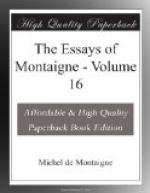Another time, they burnt in the same fire four hundred and sixty men alive at once, the four hundred of the common people, the sixty the principal lords of a province, simply prisoners of war. We have these narratives from themselves for they not only own it, but boast of it and publish it. Could it be for a testimony of their justice or their zeal to religion? Doubtless these are ways too differing and contrary to so holy an end. Had they proposed to themselves to extend our faith, they would have considered that it does not amplify in the possession of territories, but in the gaining of men; and would have more than satisfied themselves with the slaughters occasioned by the necessity of war, without indifferently mixing a massacre, as upon wild beasts, as universal as fire and sword could make it; having only, by intention, saved so many as they meant to make miserable slaves of, for the work and service of their mines; so that many of the captains were put to death upon the place of conquest, by order of the kings of Castile, justly offended with the horror of their deportment, and almost all of them hated and disesteemed. God meritoriously permitted that all this great plunder should be swallowed up by the sea in transportation, or in the civil wars wherewith they devoured one another; and most of the men themselves were buried in a foreign land without any fruit of their victory.
That the revenue from these countries, though in the hands of so parsimonious and so prudent a prince,—[Phillip ii.]—so little answers the expectation given of it to his predecessors, and to that original abundance of riches which was found at the first landing in those new discovered countries (for though a great deal be fetched thence, yet we see ’tis nothing in comparison of that which might be expected), is that the use of coin was there utterly unknown, and that consequently their gold was found all hoarded together, being of no other use but for ornament and show, as a furniture reserved from father to son by many puissant kings, who were ever draining their mines to make this vast heap of vessels and statues for the decoration of their palaces and temples; whereas our gold is always in motion and traffic; we cut it into a thousand small pieces, and cast it into a thousand forms, and scatter and disperse it in a thousand ways. But suppose our kings should thus hoard up all the gold they could get in several ages and let it lie idle by them.
Those of the kingdom of Mexico were in some sort more civilised and more advanced in arts than the other nations about them. Therefore did they judge, as we do, that the world was near its period, and looked upon the desolation we brought amongst them as a certain sign of it. They believed that the existence of the world was divided into five ages, and in the life of five successive suns, of which four had already ended their time, and that this which gave them light was the fifth. The first perished, with all




